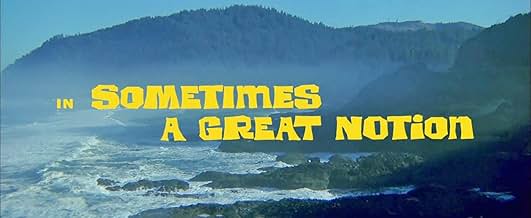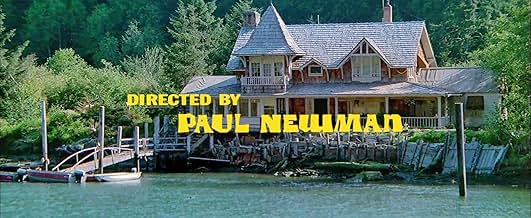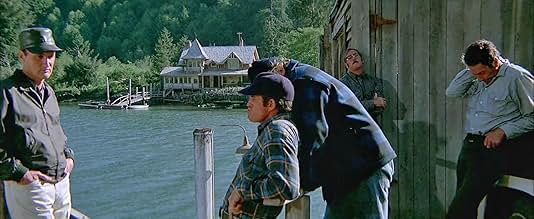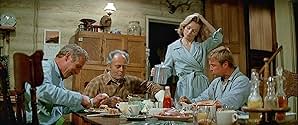IMDb-BEWERTUNG
6,9/10
4819
IHRE BEWERTUNG
Füge eine Handlung in deiner Sprache hinzuA family of fiercely independent Oregon loggers struggles to keep their family business alive amid changing times.A family of fiercely independent Oregon loggers struggles to keep their family business alive amid changing times.A family of fiercely independent Oregon loggers struggles to keep their family business alive amid changing times.
- Für 2 Oscars nominiert
- 2 Nominierungen insgesamt
Empfohlene Bewertungen
Sometimes a Great Notion (1970)
This is an amazing story, with some harrowing scenes and really terrific acting. And it's based on a Ken Kesey novel that is one of my favorite books, a sprawling, difficult, layered up masterpiece of some kind, for its time at least, and for when I read it as a 20 year old looking for meaning in life. There are so many threads in the book, powerful themes and small ones, that get interwoven into a vivid, unashamed adventure-romance with interior explosions and characters clashing with nature and cultures clashing of cultures, it's really impossible to make a movie out of it.
But Paul Newman, as lead character and, yes director (stepping in when the original director left), has tried. The result is grossly unappreciated, because the strengths here make the flaws bearable. The flaws are clear. The casting is uneven. Lee Remick is a character from another movie plopped into this rough and tumble Oregon backwoods scene, and the second leading man, a kind of implied narrator to it all, is played by little known Michael Serrazin, a pretty boy who holds his own but is uninspiring.
Furthermore, the filming is straight on and meant to show what is happening more than contribute to the ambiance of the experience. There are scenes of machinery and logging that are impressive in their raw scale and masculinity, for sure, but that is partly fast editing at work, and amazing subject material. The rainy coastal landscape, the rambling house on the river, even the dirt bike race and the scenes of the little town all make you yearn for more intensity and involvement, visually.
The music by Henry Mancini shows the strain of this amazing composer as he moves from the light orchestral work he did in the 1960s ("Moon River," "Pink Panther," "Days of Wine and Roses," etc.) to something embracing country, rock and roll, and contemporary music being used so effectively in New Hollywood films. It's halfway there, but gives a falseness to some of the scenes that gets in the way of the gritty, emotional drama to it all.
And I mean emotional. Some have criticized Kesey's novel for overachieving. It tries to deal with every big issue there is in one book: individualism and love, above all, but a highly dysfunctional family, the new America of college and drugs vs. the old one of hard work and croneyism, raw beauty in the landscape vs. exploiting nature for commercial gain, and loyalty to family in all its layers of father and sons, sons and lovers, and workers as part of extended family. But that's what makes the book and the movie terrific. The scenes here of Newman doing anything, of Henry Fonda playing the tough as nails dad, and of some of the side actors in their rough daily working roles in the woods are right on. The hospital scene with Newman and Fonda is a small gem, and the famous scene of Newman trying to free his little brother (played by Richard Jaeckel) caught under a log under water is utterly unforgettable. Utterly.
There is a lot of filler her, lots of falling trees and bikers racing and a building of the toughness of this manly world. But hang in there for the other stuff. And read the book.
This is an amazing story, with some harrowing scenes and really terrific acting. And it's based on a Ken Kesey novel that is one of my favorite books, a sprawling, difficult, layered up masterpiece of some kind, for its time at least, and for when I read it as a 20 year old looking for meaning in life. There are so many threads in the book, powerful themes and small ones, that get interwoven into a vivid, unashamed adventure-romance with interior explosions and characters clashing with nature and cultures clashing of cultures, it's really impossible to make a movie out of it.
But Paul Newman, as lead character and, yes director (stepping in when the original director left), has tried. The result is grossly unappreciated, because the strengths here make the flaws bearable. The flaws are clear. The casting is uneven. Lee Remick is a character from another movie plopped into this rough and tumble Oregon backwoods scene, and the second leading man, a kind of implied narrator to it all, is played by little known Michael Serrazin, a pretty boy who holds his own but is uninspiring.
Furthermore, the filming is straight on and meant to show what is happening more than contribute to the ambiance of the experience. There are scenes of machinery and logging that are impressive in their raw scale and masculinity, for sure, but that is partly fast editing at work, and amazing subject material. The rainy coastal landscape, the rambling house on the river, even the dirt bike race and the scenes of the little town all make you yearn for more intensity and involvement, visually.
The music by Henry Mancini shows the strain of this amazing composer as he moves from the light orchestral work he did in the 1960s ("Moon River," "Pink Panther," "Days of Wine and Roses," etc.) to something embracing country, rock and roll, and contemporary music being used so effectively in New Hollywood films. It's halfway there, but gives a falseness to some of the scenes that gets in the way of the gritty, emotional drama to it all.
And I mean emotional. Some have criticized Kesey's novel for overachieving. It tries to deal with every big issue there is in one book: individualism and love, above all, but a highly dysfunctional family, the new America of college and drugs vs. the old one of hard work and croneyism, raw beauty in the landscape vs. exploiting nature for commercial gain, and loyalty to family in all its layers of father and sons, sons and lovers, and workers as part of extended family. But that's what makes the book and the movie terrific. The scenes here of Newman doing anything, of Henry Fonda playing the tough as nails dad, and of some of the side actors in their rough daily working roles in the woods are right on. The hospital scene with Newman and Fonda is a small gem, and the famous scene of Newman trying to free his little brother (played by Richard Jaeckel) caught under a log under water is utterly unforgettable. Utterly.
There is a lot of filler her, lots of falling trees and bikers racing and a building of the toughness of this manly world. But hang in there for the other stuff. And read the book.
A terrific view of life in the late 60s early 70s northwest, before tech moved in. An early Alaska- if you wanted to survive you logged, farmed, fished or worked for Boeing or Kenworth. I had to watch this as a school assignment and was never sorry for it. There are some clumsy moments which I think a movie fan is able to overlook. Sarrazin was kind of an odd addition but wasn't that much of a distraction. I especially liked Jaeckel's role as the comedian. Newman was, well Newman. Pretty much good regardless, as was Fonda. Anyone in the northwest that hasn't seen this should give it look, though it may be hard to find.
Kesey's superb epic novel with its shifting points of view and verb tense is far too complex a work to adapt directly. Kesey's prose while exceptionally cinematic in its description and action ironically proves unfilmable.
That said, Paul Newman and his production team have created a most admirable and solid, if rather top heavy adaption of Kesey's excellent novel.
The dialogue while rather shallow and weak in spurts (Kesey's rich vernacular is lost)is overcome by a wonderful ensemble cast featuring some of America's finest. Who better that Henry Fonda to play Newman's father? Richard Jaekel richly earns the Oscar nomination as the dim-witted but enthusiastic born again lumberjack Joe-Ben. The famous scene where Newman tries desperately to save Jaekel's character from drowning is heartbreakingly tragic and darkly comic. It is a marvelous example of direction.
Newman spent a great deal of time in my native Oregon researching the part and the film and his homework shows. Kesey's rich descriptions of the land remain largely intact. The sense of time and place is impressively captured in the photography of rusting metal, dripping ferns, rotting wood and mildewed carpets. This is a film that one can almost smell.
Newman is one of the finest artists ever to come out of Hollywood. Not only as an actor, but also as a director. He instinctivly knows how to illicit naturalistic, comfortable and utterly human performances from his casts and Sometimes a Great Notion is no exception. Well worth a look. 7 out of 10 stars.
That said, Paul Newman and his production team have created a most admirable and solid, if rather top heavy adaption of Kesey's excellent novel.
The dialogue while rather shallow and weak in spurts (Kesey's rich vernacular is lost)is overcome by a wonderful ensemble cast featuring some of America's finest. Who better that Henry Fonda to play Newman's father? Richard Jaekel richly earns the Oscar nomination as the dim-witted but enthusiastic born again lumberjack Joe-Ben. The famous scene where Newman tries desperately to save Jaekel's character from drowning is heartbreakingly tragic and darkly comic. It is a marvelous example of direction.
Newman spent a great deal of time in my native Oregon researching the part and the film and his homework shows. Kesey's rich descriptions of the land remain largely intact. The sense of time and place is impressively captured in the photography of rusting metal, dripping ferns, rotting wood and mildewed carpets. This is a film that one can almost smell.
Newman is one of the finest artists ever to come out of Hollywood. Not only as an actor, but also as a director. He instinctivly knows how to illicit naturalistic, comfortable and utterly human performances from his casts and Sometimes a Great Notion is no exception. Well worth a look. 7 out of 10 stars.
This is one of my favorite movies. It has excellent acting, a great story (by the late great Ken Kesey), and some very intense scenes. I found that Paul Newman's direction was very well done. This is a movie for fans of great character development.
First, Paul Newman, as usual, did an outstanding job. This is my favorite character. He was able to pull off this very icey dominance, even over his own father. He plays his character like he is Hank Stamper. Paul Newman always does a great job in his movies, but I think this one I especially like because he isn't as likeable as Cool Hand Luke or Fast Eddie (which are two other favorite characters and movies of mine).
Then there is Henry Fonda, who plays the eldest Stamper, Henry. He was a very interesting character, and Henry Fonda did a great job at playing him. He and Hank both head the family, and he and Paul Newman have a fractured relationship that is sort of crass, but still fun to see them on-screen together.
Then there is Michael Sarrazin, who plays the outcast Leeland Stamper. He is probably the best character. While all the other Stampers have leather skin and huge scars from wood chips, he has big bushy hair and is not a big barrel chested logger. Hank and Henry treat him like crap almost the whole movie, because he doesn't belong. Leeland just came back from the city, and he came back for the sole purpose of getting even with Hank.
And Finally, there is Lee Remick, who plays Hank's shut out wife Viv. She is probably the most complex character, simply because she only lets on what she thinks of her situation in little bits. She and Hank used to be wild lovers, but Hank is working so hard because of the logger's strike, he pretty much shuts her out, and so she begins to drift away from Hank.
My only problem with this movie is that they didn't have the big rights of passage fight between Hank and Leeland. In the book Leeland fought Hank after everything bad happened to the Stampers, as a way to show Hank that he isn't in control. I think that was the biggest part in the novel, and they left it out. But aside from that, I loved this movie.
Check this movie, or the book out for that matter, if you enjoy strong character development, many tragic events, and stories that take place in the backwoods of Oregon. 9/10
First, Paul Newman, as usual, did an outstanding job. This is my favorite character. He was able to pull off this very icey dominance, even over his own father. He plays his character like he is Hank Stamper. Paul Newman always does a great job in his movies, but I think this one I especially like because he isn't as likeable as Cool Hand Luke or Fast Eddie (which are two other favorite characters and movies of mine).
Then there is Henry Fonda, who plays the eldest Stamper, Henry. He was a very interesting character, and Henry Fonda did a great job at playing him. He and Hank both head the family, and he and Paul Newman have a fractured relationship that is sort of crass, but still fun to see them on-screen together.
Then there is Michael Sarrazin, who plays the outcast Leeland Stamper. He is probably the best character. While all the other Stampers have leather skin and huge scars from wood chips, he has big bushy hair and is not a big barrel chested logger. Hank and Henry treat him like crap almost the whole movie, because he doesn't belong. Leeland just came back from the city, and he came back for the sole purpose of getting even with Hank.
And Finally, there is Lee Remick, who plays Hank's shut out wife Viv. She is probably the most complex character, simply because she only lets on what she thinks of her situation in little bits. She and Hank used to be wild lovers, but Hank is working so hard because of the logger's strike, he pretty much shuts her out, and so she begins to drift away from Hank.
My only problem with this movie is that they didn't have the big rights of passage fight between Hank and Leeland. In the book Leeland fought Hank after everything bad happened to the Stampers, as a way to show Hank that he isn't in control. I think that was the biggest part in the novel, and they left it out. But aside from that, I loved this movie.
Check this movie, or the book out for that matter, if you enjoy strong character development, many tragic events, and stories that take place in the backwoods of Oregon. 9/10
A lot of people seem to be down on this film for reasons I really can't understand. The film seem to stretch everyone's creative levels especially one performer I'll single out later.
Henry Fonda plays the head of the Stamper clan who own a lot of acreage in Oregon timber country and the family business is cutting logs. Enough to survive, but they do it on their own. But a strike by timber union loggers causes enmity between them and the Stampers who are seen as scabs.
There are some similarities between Fonda's character and the family patriarch he played in Spencer's Mountain. But whereas Spencer had a noble dignity to him, Ben Stamper is a dissolute old cuss who has enjoyed all the vices known and imparted a love for them unto his children. They would be half brothers Paul Newman and Michael Sarrazin who've also got issues between themselves that may prevent the Stampers from forming a united front.
Newman directed the film and he had a good eye for the scenery of the Oregon logging country. And he got some good performances from the rest of the cast. One of them Richard Jaeckel got his career role as a Stamper cousin. Newman reached his creative heights in Jaeckel's death scene which was played between him and Jaeckel. It's a long drawn out affair for reasons you'll know if you see the film. It will stay with you forever as it has me since I saw the film when it first came out. Richard Jaeckel got a nomination for Best Supporting Actor and the pity is that he was up against another popular character actor in Ben Johnson who won for The Last Picture Show.
Sometimes A Great Notion also got a second Oscar nomination for Best Song with We're All His Children by Henry Mancini and Alan and Marilyn Bergman. Bing Crosby recorded a fine version of it on one of his albums. It lost however to theme from Shaft.
Paul Newman deserved a lot more credit for this film than he got. I think if you see Sometimes A Great Notion you'll agree.
Henry Fonda plays the head of the Stamper clan who own a lot of acreage in Oregon timber country and the family business is cutting logs. Enough to survive, but they do it on their own. But a strike by timber union loggers causes enmity between them and the Stampers who are seen as scabs.
There are some similarities between Fonda's character and the family patriarch he played in Spencer's Mountain. But whereas Spencer had a noble dignity to him, Ben Stamper is a dissolute old cuss who has enjoyed all the vices known and imparted a love for them unto his children. They would be half brothers Paul Newman and Michael Sarrazin who've also got issues between themselves that may prevent the Stampers from forming a united front.
Newman directed the film and he had a good eye for the scenery of the Oregon logging country. And he got some good performances from the rest of the cast. One of them Richard Jaeckel got his career role as a Stamper cousin. Newman reached his creative heights in Jaeckel's death scene which was played between him and Jaeckel. It's a long drawn out affair for reasons you'll know if you see the film. It will stay with you forever as it has me since I saw the film when it first came out. Richard Jaeckel got a nomination for Best Supporting Actor and the pity is that he was up against another popular character actor in Ben Johnson who won for The Last Picture Show.
Sometimes A Great Notion also got a second Oscar nomination for Best Song with We're All His Children by Henry Mancini and Alan and Marilyn Bergman. Bing Crosby recorded a fine version of it on one of his albums. It lost however to theme from Shaft.
Paul Newman deserved a lot more credit for this film than he got. I think if you see Sometimes A Great Notion you'll agree.
Wusstest du schon
- WissenswertesThis was the first film ever shown on HBO when the service premiered in 1972.
- PatzerIn the fox-hunt scene, when the fox jumps over the fence, it becomes apparent that the fox is wearing a 1/4" black collar with a little tiny bell on it.
- Zitate
Hank Stamper: [singing] Don't ever hit your mother with a shovel. It will leave a dull impression on her mind. Paul Newman said the same line in "Butch Cassidy and the Sundance Kid".
- Alternative VersionenIn the earliest video release version, circa 1982, when Leland first arrives, a crane shot reveals Hank looking down below at the family reunion. In the most current VHS release, circa 1994, the crane shot is edited out and replaced with just a single cut from Viv, with an audio bridge to Hank on the roof.
- VerbindungenFeatured in Salut für ...: Salut für Henry Fonda (1978)
- SoundtracksAll His Children
Lyrics by Marilyn Bergman and Alan Bergman
Music by Henry Mancini
Sung by Charley Pride
Top-Auswahl
Melde dich zum Bewerten an und greife auf die Watchlist für personalisierte Empfehlungen zu.
- How long is Sometimes a Great Notion?Powered by Alexa
Details
Box Office
- Budget
- 3.660.000 $ (geschätzt)
- Laufzeit
- 1 Std. 54 Min.(114 min)
- Seitenverhältnis
- 2.35 : 1
Zu dieser Seite beitragen
Bearbeitung vorschlagen oder fehlenden Inhalt hinzufügen

































